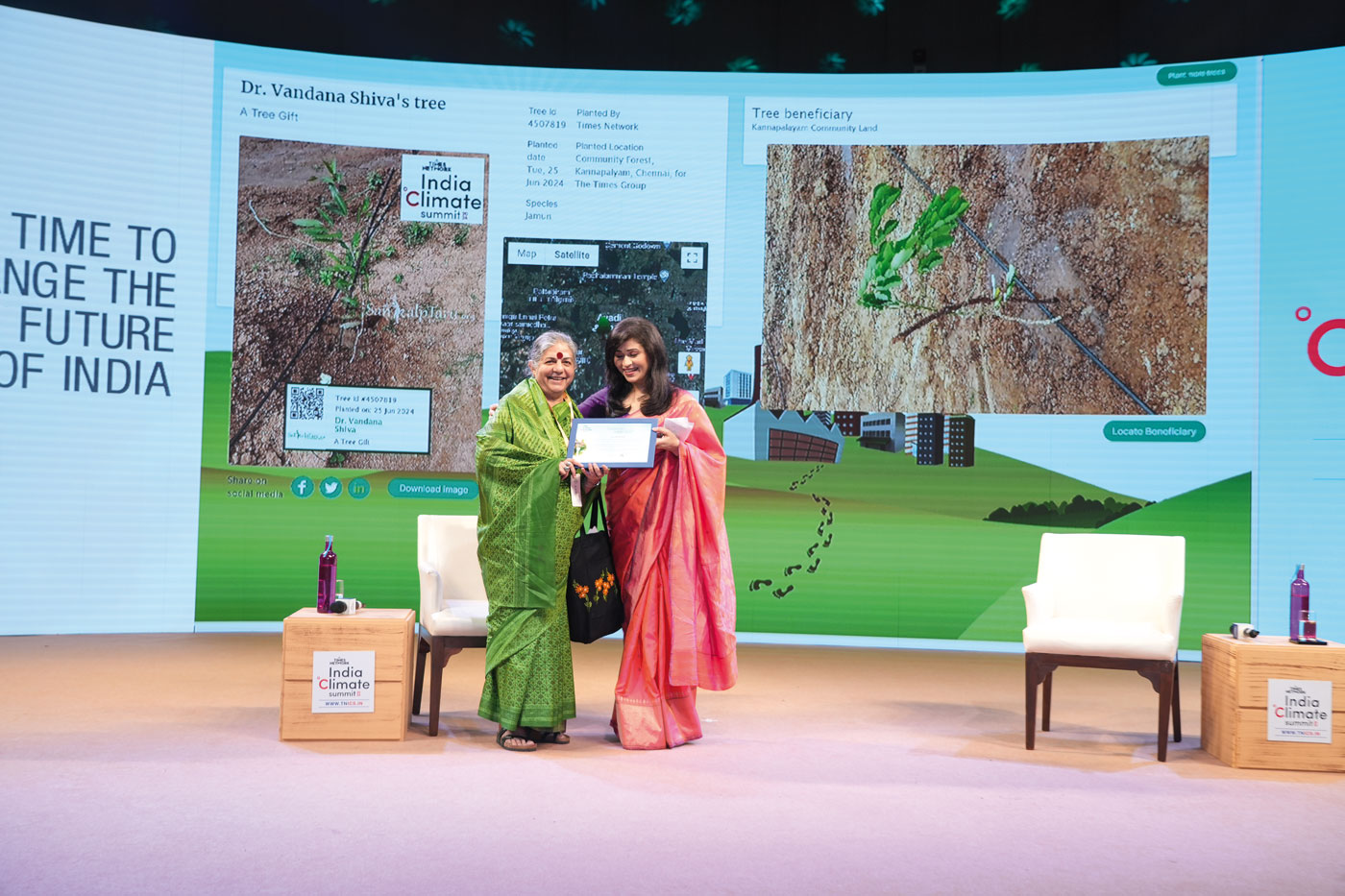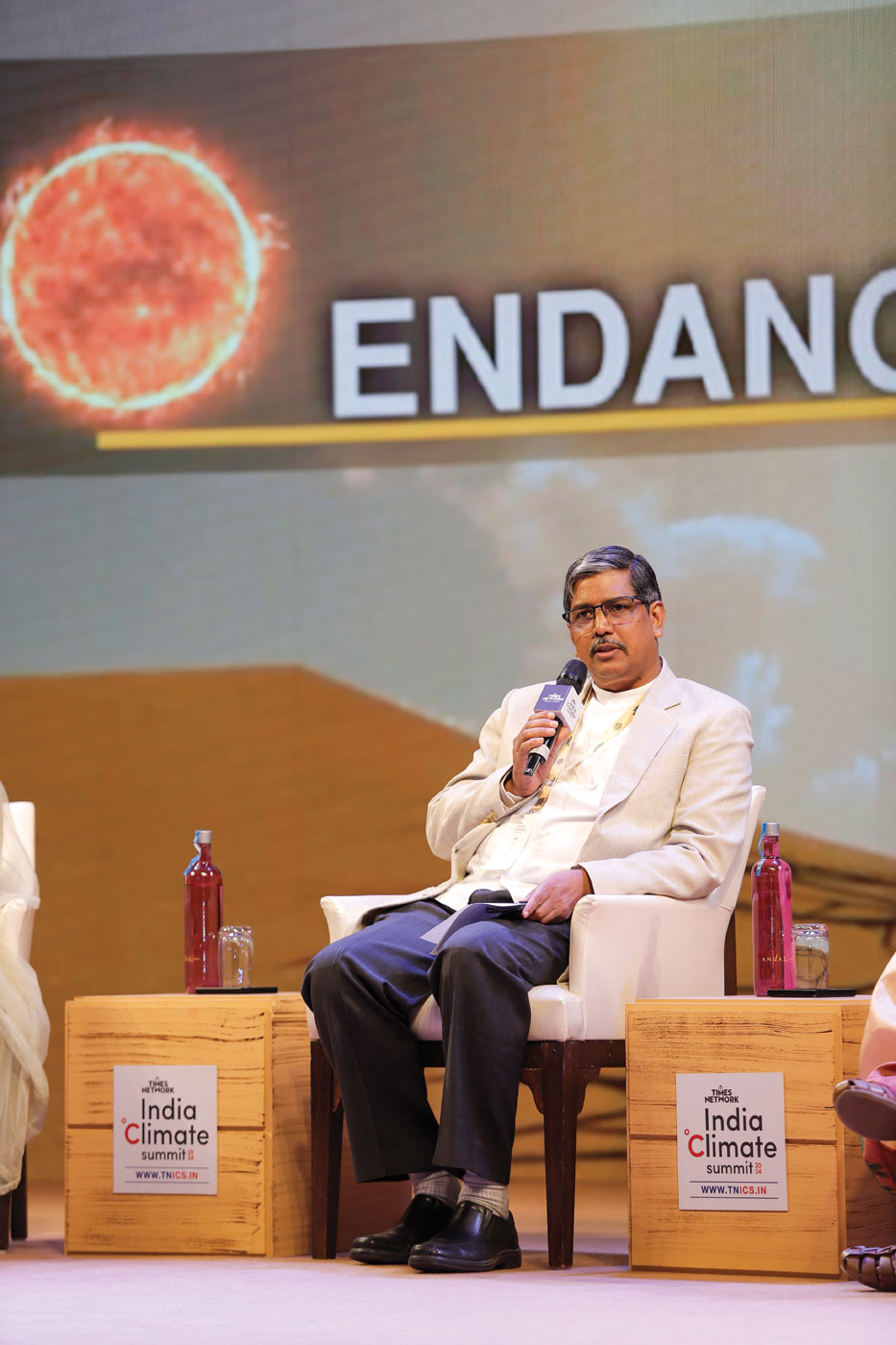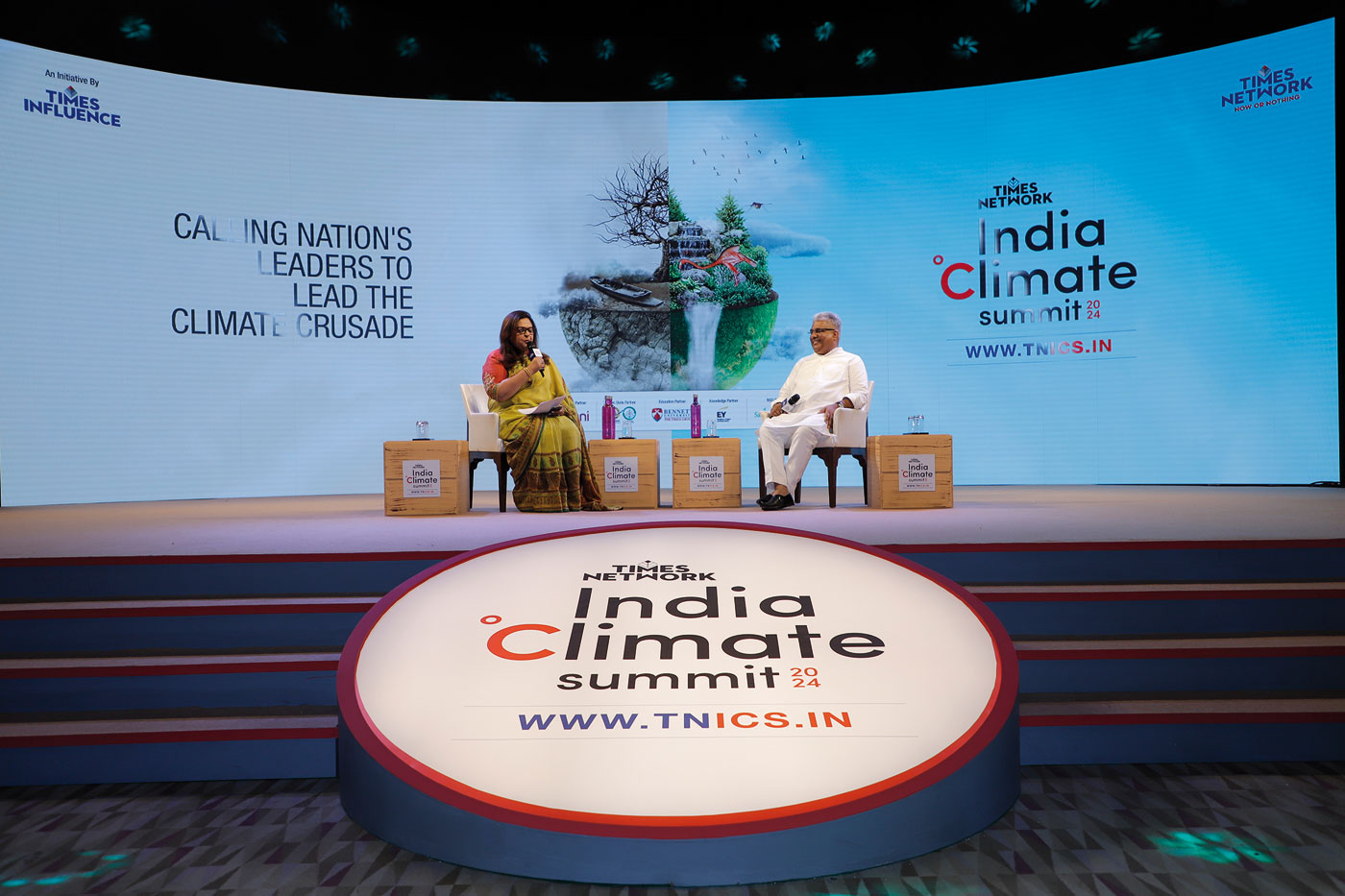Our Biodiversity Holds Climate Solutions
First published in Sanctuary Asia,
Vol. 44
No. 8,
August 2024
A Sanctuary Report
Biodiversity, the rich floral and faunal life of our planet and the habitats in which they live and interact with one another and their environment – from grasslands to deserts, forests, and oceans – holds the key to our survival on Earth.
According to the United Nations’ Intergovernmental Science-Policy Platform on Biodiversity and Ecosystem Services (IPBES), more than a million floral and faunal species are under threat of extinction on account of human actions. The ongoing destruction, degradation and overexploitation of grasslands, forests, and wetlands have led to a sharp decline in biodiversity. While climate change is a contributing factor – it is but a repercussion of societal behaviour – excessive production and consumption patterns, human population growth, urbanisation, land conversion for unsustainable industrial agriculture, exploitative meat industry, and commercial overfishing all together compound the threat to the planet.

A herd of male barasingha Rucervus duvauceli look in anticipation towards an approaching group of female deer. Brought back from the brink of extinction, only 3,000-4,000 swamp deer are now distributed in Nepal and India. Photo: Nitish Madan/Sanctuary Photolibrary.
Consider the immense decline of bees for pollination. The equation is simple – if bees go extinct, it could lead to the collapse of entire ecosystems, threaten global food security and the resilience of our agricultural systems. This could further lead to freshwater shortages and greater climate instability. The loss of biodiversity – whether by direct ecological disturbances such as wildfires, floods, loss of endemic species, or indirect disturbances as a result of human activities ranging from fossil fuel use to overexploitation of resources – is the single most important predictor of the health of our planet. No discussion on climate change is therefore credible without considering the biodiversity loss we have inflicted on the planet, and in turn the erosion of the very foundations of our food, water and soil security, health, livelihoods, and economies.
The Times Network India Climate Summit held in June 2024 in New Delhi brought together activists, business leaders and policy makers, and was a welcome step towards the free and fair expression of views concerning the potential damage that the climate crisis could wreak upon India. Such varied opinions on the potential solutions are vital as India moves forward into uncharted territory to negotiate survival on an increasingly hostile planet, whose infrastructures of survival have been severely damaged by human activities across the globe.
The Summit was kicked off, and underscored, by a clear Times Network position statement highlighting the fact that India is indeed vulnerable to the effects of climate change with significant risks to the environment, human health, and the economy. The Minister for Environment, Forests and Climate Change, Bhupender Yadav, assured the audience that India is “striving for climate action from the individual to the government’s policy-making levels.” He also stressed that carbon emission-intensive anthropocentric development, unsustainable consumption patterns, and desertification are the three pressing issues that confront the world today.

The panel discussion moderated by Deepti Sachdeva, Consulting Editor, Times Now (extreme left), with Purnima Devi Barman, UNEP Earth Champion; Dr. Anish Andheria, President & CEO of the Wildlife Conservation Trust; and Bittu Sahgal, Editor, Sanctuary Asia and Founder, Sanctuary Nature Foundation. Photo Courtesy: The Times Network.
There was consensus that our biggest ally in fighting the vagaries of climate change is biodiversity protection. The planet’s land and oceans serve as natural carbon sinks that absorb large amounts of greenhouse gas emissions, and it is only logical that protecting and restoring biodiversity-rich habitats is vital to minimise and reverse climate impacts. Dr. Anish Andheria, President, Wildlife Conservation Trust, drew much attention as he said, “We don’t even ask, why this planet should be called ‘Earth’ when the ocean is 70 per cent of this planet. So we need to start changing our paradigms, changing that understanding. The ocean is the conveyor belt for energy production. We talk of renewable energy, but energy means food. All of us humans, seven point some billion human beings can survive. We are all cells that survive on fuel, and that fuel is energy that comes from food. Most of our ecosystems are still producing that energy for us. That has not changed over the last 300 million years, or even the last 300 years that we have started controlling this planet. So if the ocean is going to be impacted by climate change, which it is, we must pay heed to this alarm call.” He gave the example of how between March 2024 and June 2024, coral reefs in Lizard Island, which is in the Great Barrier Reef, considered to be the most secure, has been bleached by 95 per cent. He reiterated, “The food that is produced by the corals, the seagrass, all that is getting impacted. And as that happens, our natural ecosystems are going to have cascading effects on our cropping patterns. It is going to have a huge impact on food availability. It is eventually going to cause social unrest.”

The India Climate Summit brought together conservationists and human rights and climate experts such as environmentalist Vandana Shiva, who was felicitated by Shreya Dhoundial, Executive Editor, Mirror Now. Photo Courtesy: The Times Network.
Vandana Shiva, environmental activist, food sovereignty advocate, ecofeminist and anti-globalisation author, also spoke of the impact of climate change on agriculture. She stressed, “This country is fed by its small farmers. Farmers want to be farmers and grow food to feed the world. However, 75 per cent of our soil and water has been destroyed by the industrial model of agriculture, which is based on fossil chemicals. This has massive externalities, destroying the water and resulting in serious greenhouse gas emissions. Nitrous oxide, for example, is 300 times more damaging to the environment and climate than carbon dioxide. Sadly, we’ve forgotten two lessons from nature – nature has no waste, and causes no pollution. And nature doesn’t extract, it recycles. Ecological farming is about two principles, the principle of diversity and the principle of nutrition.”
The IPBES 2019 report recommends, “transformative change” that involves shifting away from GDP as a key measurement for economic growth, and shifting to holistic indicators that reflect quality of life and nature-human interactions. It recommends transferring existing subsidies for fossil fuels, industrial fishing, and agriculture to biodiversity conservation and an increase of the number of protected land and sea areas equivalent to a third of their areas.

Mozaharul Alam, Officer-in-Charge, UNEP India Country Office and Regional Coordinator, Climate Action UNEP Asia and the Pacific Office, Bangkok, spoke at the India Climate Summit. Photo Courtesy: The Times Network.
This is exactly what Dr. Andheria endorsed. He spoke of how grasslands in India were not valued. In his words: “More than 200,000 sq. km. of grasslands have vanished from the country in just 100 years. So when the cheetah reintroduction project was introduced, many wildlifers were elated that this was an opportunity for grasslands to be restored. Imagine a country, which is 35 lakh sq. km., doesn’t have grasslands covering even 3,000 sq. km. for a carnivore that used to exist in this country.”

A file photo of a 2019 flood in Bangladesh where women, children and less mobile people were the worst victims. Many women with children had to live under the open skies until they found shelter. About five million people were affected by the flood. Photo: Public domain/UN Women Asia And Pacific.
He added, “I am always saddened by the fact that natural ecosystems in India, first of all, only mean forests. We still don’t understand that ‘ecosystem’ is not equal to forest alone. Ecosystems could be under the sea. Ecosystems are in the rivers, grasslands, and marshlands. The Honourable Environment Minister said at the Summit that the energy output from wastelands such as the marshes in Gujarat and Rajasthan are going to be used for renewable energy. First of all, India needs to understand that we cannot have a Wasteland Atlas. Most of these saltwater marshes, grasslands and other ecosystems that we don’t identify as forests are part of that Wasteland Atlas. I think unless we integrate our renewable energy plans with our natural resource conservation and management plans, we will never be able to solve this puzzle. Because when we put out all those flashy numbers as to what needs to be done, how much gigawatts of renewable energy is needed, we have to understand that all these natural infrastructures have to then be replaced by renewable cells such as solar or wind energy. All that needs infrastructure. And that is impinging upon already degraded lands of India.”
The special address at the Summit was delivered by Bhupender Yadav, Minister of Environment, Forest and Climate Change. Other speakers included Erik Solheim, former Under-Secretary-General of the United Nations and Executive Director of UNEP; Dr. Vibha Dhawan, Director General, TERI; Mozaharul Alam, Regional Climate Change Coordinator (UNEP) and APAN Secretariat; Arun Sharma, Group Head for Sustainability and Climate Change and Advisor to Chairman, Adani Group; Bittu Sahgal, Editor,
Sanctuary Asia magazine and Founder, Sanctuary Nature Foundation; Dr. Vandana Shiva, environmentalist; Dr. Ajay Mathur, Director General, International Solar Alliance; Dr. Anish Andheria, President and CEO, Wildlife Conservation Trust; Mads Qvist Frederiksen, ED, Arctic Economic Council; Ricky Kej, three-time Grammy winner and United Nations Goodwill Ambassador; and Sumaira Abdulali, environmentalist. For the complete coverage:
https://www.youtube.com/live/X4t09bbliDcThe loss of habitats and biodiversity was a common chain throughout the summit. Purnima Barman, UNEP Earth Champion, known for her conservation efforts to protect the Greater Adjutant Stork, described her journey and how she found that solutions lie in communities and women. She concluded by saying, “We have observed the impacts of climate change. In the last 20 years I have seen that several wetlands are shrinking, which is affecting not just the Hargila but also all wading birds and other migratory species, and so we have to work on that.” She made a heartfelt plea requesting policymakers, universities, and institutions: “We live in a biodiversity hotspot in the northeast, in Assam. I request all institutions to bring more students to study the effect of climate change.”

Minister of Environment, Forest and Climate Change Bhupender Yadav and Navika Kumar, Group Editor-In-Chief, Times Now and Times Now Navbharat in conversation at the Times Network India Climate Summit in June 2024. He assured the audience that India is “striving for climate action from the individual to the government’s policy-making levels.” Photo Courtesy: The Times Network.
Founder of the Sanctuary Nature Foundation, Bittu Sahgal, reminded the audience of Herman Daly’s words that the economy is a wholly owned subsidiary of the biosphere. He said, “We believe, for instance, that our best security is financial security. It is not. It could vanish within a moment. The $40 billion illegal wildlife trade was ignored. Professor Partho Dasgupta’s Dasgupta Review has absolute evidence that this was the reason for our pandemic, that coupled with ecosystem destruction.” He added, “The economist Lord Nicholas Stern, from the India Observatory, London School of Economics, came out with a Stern Review 13 or 14 years ago, where he pointed out that the cost of inaction is going to be much higher than the cost of action. And we are seeing that now every single day. Wildfires in Canada, cyclones in Florida, half of Chennai drowned, half of Pakistan drowned.”
“The climate summit was a welcome initiative by the Times Network, bringing together stalwarts from diverse conservationists to human rights and climate experts. As an expansion, under the Times umbrella, various print and digital/social media professionals were able to listen and absorb different points of view, all unanimously agreeing on the criticality of the global climate crisis.
With its vast reach, The Times Network has the ability to invite views on diverse climate action plans and outreach programmes to achieve solutions to mitigate and adapt to the worst impacts of the climate catastrophes that lie ahead. The Times Network would perform a useful function by facilitating and broadbasing more such moderated sessions involving educational institutions, schools, and universities. This would require an interface between experts and educationists to enable climate change data to reach students effectively, thus creating a multiplier effect that the young would amplify through their own networks.
As was the case with the India Climate Summit, hopefully local and state governments will be viscerally involved, and influenced, so as to incorporate climate considerations into town and city planning, and to guide and encourage citizens’ climate action in the difficult days ahead.”
– Dr. Parvish Pandya, Consultant Natural History and Science, Sanctuary Nature Foundation
Rahul Bose, actor and social activist, hit the nail on the head, when he said, “The problem with climate change is that it seems remote… I cannot change it, someone else has to do that. It’s the hottest year in history. It still seems far away, it’s the weather, what am I going to do about that? If somehow people could be made to understand how immediate and individually affecting climate change has become, then people will start to care. It’s not enough to say that my lung capacity is reducing because of bad air, but what do I do about it? The real change is to try and find ways in which people can be convinced that if they do something, things will change.”
This was echoed by Mr. Sahgal who said, “We don’t have any more time to fight with each other. I’m really worried because the economic principle says that if you undervalue an asset, you are destined to lose it. A river is not just a river, it’s an infrastructure. The glaciers and mangroves are an infrastructure. People who live in Kolkata should go and worship the mangroves because they would be wiped out by the cyclones, if it were not for that barrier. Sadly, these things cost us nothing. So we don’t value it.”







